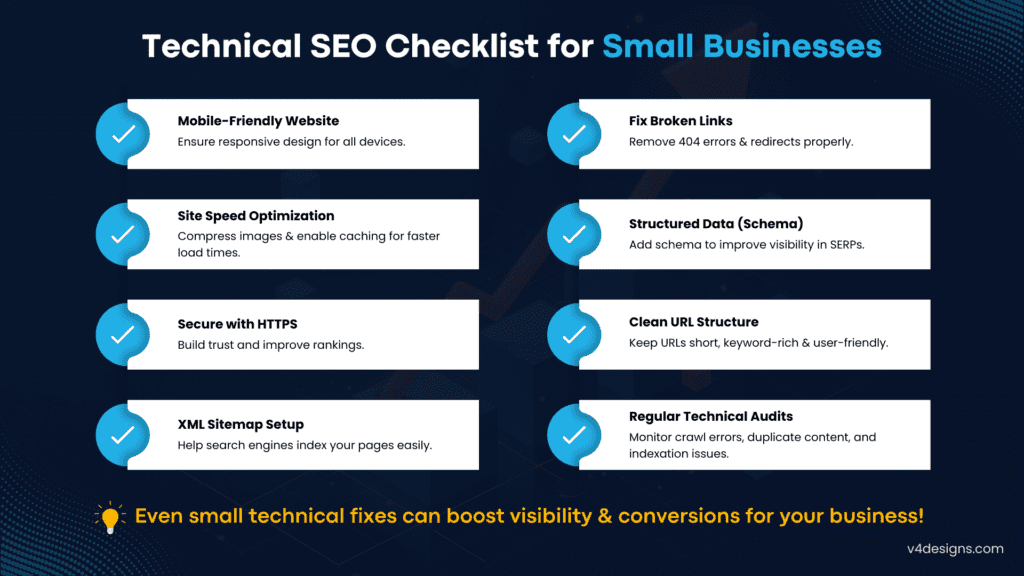Why is technical SEO important for small businesses? Building a beautiful website, crafting compelling content, and investing in marketing. Yet, your business remains invisible online, lost in the vast sea of competitors. This frustrating reality is a common pain point for many small business owners who wonder why their efforts aren’t translating into traffic and sales. The answer often lies hidden in the code and structure of your website, in an area known as technical SEO.
Understanding why is technical SEO important for small businesses is the first step toward claiming your rightful spot in search engine results. Without a solid technical foundation, even the best content can fail to rank, leaving your business undiscovered by the customers who need you most. It’s the fear of pouring time and money into a website that search engines can’t even understand, making all your hard work pointless.

What is Technical SEO and Why Does It Matter?
Imagine your website is a brilliant book, but it’s written in a language search engines can’t read, has missing pages, and a confusing table of contents. No one will ever get to appreciate its story. This is what happens when a site has poor technical health.
What is technical SEO, and why is technical SEO important for small businesses? It’s the process of optimizing your website’s backend infrastructure to help search engines like Google crawl, index, and understand your content more effectively. It’s the framework that supports all your other marketing efforts.
Technical SEO vs. Regular SEO: Key Differences
While often discussed together, it’s crucial to understand the technical SEO vs regular SEO differences.
- Regular SEO (On-Page/Off-Page): Focuses on content quality, keyword research, and building backlinks. This is about what, the visible content and its authority.
- Technical SEO: Focuses on the how, how easily search engines can access and interpret that content. It covers site speed, mobile-friendliness, site architecture, and security.
Skipping the technical side is like building a tall house on weak ground. Eventually, it will crumble. You desire a website that not only looks great but also performs flawlessly, attracting a steady stream of qualified leads and driving business growth.
A DIY Technical SEO Strategy for Startups
The good news is that you don’t need to be a coding genius to make significant improvements. Many business owners can tackle the basics with a clear plan. Here’s how to discover and solve the most common technical SEO problems.
Running a Basic Technical Audit
First, you need to identify what’s broken. Use free tools like Google Search Console and Google’s PageSpeed Insights to get a baseline report. These tools will flag issues like slow loading times, mobile usability problems, and broken links. This initial check-up turns an unknown fear into a manageable list of tasks.
An Ultimate Technical SEO Checklist for Beginners
Once you know the issues, you can start fixing them. Here are actionable steps for DIY technical SEO for business owners.
- Improve Site Speed: Your website should load in under 3 seconds.
* Compress images before uploading them.
* Enable browser caching.
* Minimize the use of heavy plugins or scripts. - Ensure Mobile-Friendliness: Most users browse on their phones. Your site must adapt seamlessly to all screen sizes. Use Google’s Mobile-Friendly Test to check your pages.
- Create a Logical Site Structure: Organize your website with a clear hierarchy. Use a simple navigation menu and internal links to connect related pages. This helps both users and search engines find content easily.
- Fix Broken Links (404 Errors): Links that lead to non-existent pages create a frustrating user experience and waste search engine crawl budget. Use Google Search Console to find and fix them.
- Use an SSL Certificate (HTTPS): Security is a confirmed ranking factor. An SSL certificate encrypts data between your site and its visitors, building trust and boosting your SEO. Ensure your URL starts with https://.
- Submit an XML Sitemap: A sitemap is a roadmap of your website for search engines. Generate one and submit it through Google Search Console to ensure all your important pages are indexed.
This technical SEO strategy for startups addresses the most critical elements that can hold a website back. By tackling these issues, you move from a state of anxiety to one of control, building a fantasy of a high-performing website that works for you 24/7.
Take Your Website to the Next Level
This guide provides a solid starting point, but technical SEO can get complex. As your business grows, you’ll need a more advanced strategy to stay ahead of the competition. Mastering your website’s technical health is a continuous journey, not a one-time fix.
If you’re ready to stop worrying about your website’s performance and start achieving your business goals, it might be time to call in the experts. V4Designs – Professional UI/UX Design & Web Development Agency can help. Whether you need the Best UI UX Design Services for Startups or comprehensive Website Redesign Services, our team is here.
As a leading User Experience Design Company in India, with a strong presence as a User Experience Design Company in Coimbatore, we are the SEO agency for startups you can trust. Stop searching for the “Best Web Design company near me” and let us build a website that delivers results. Contact V4Designs today to unlock your website’s true potential.
Don’t Miss: Best Website Redesign Services in India
FAQs
1. How long does it take to see results from technical SEO?
You can see initial improvements, like faster page speed, almost immediately after implementing fixes. However, significant ranking changes can take anywhere from a few weeks to several months as search engines recrawl and re-evaluate your site.
2. Can I do technical SEO myself?
Yes, small business owners can handle many basic technical SEO tasks using the checklist above and free tools like Google Search Console. For more complex issues or a comprehensive strategy, partnering with a professional agency is recommended.
3. Is technical SEO a one-time task?
No, technical SEO requires ongoing maintenance. Search engine algorithms change, new technologies emerge, and websites evolve. Regular audits and updates are necessary to maintain optimal performance.







